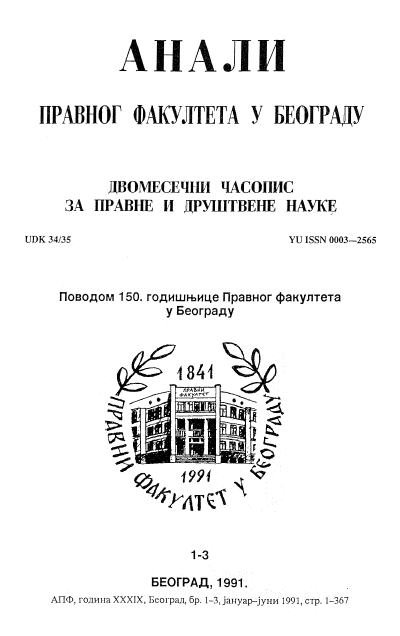КОНЦЕПТ РАДНОГ ОДНОСА У ОСНОВНОМ ЗАКОНУ О РАДНИМ ОДНОСИМА (1965) И ЊЕГОВ УТИЦАЈ НА ПРАКСУ И ТЕОРИЈУ
THE CONCEPT OF LABOUR RELATIONSHIP IN THE BASIC LAW ON LABOUR RELATIONS OF 1965 AND ITS INFLUENCE IN PRACTICE AND THEORY
Author(s): Vlajko BrajićSubject(s): Labour and Social Security Law
Published by: Правни факултет Универзитета у Београду
Keywords: Labour relationship; Negating theory; Legislation in the sphere of labour relations
Summary/Abstract: The subject-matter of this article is the development of labour relations in Yugoslavia in the period since the enactment of the Basic Law on Labour Relations (1965), including its application and influence. This period and that Law are significant since this was the time of coming to expresion of the conception of labour relations which was subsequently realized in the Law on Assocated Labour (1976). According to it, the workers enteres into mutual labour relationships within the basic organisation - the relations in the sphere of associated labour. Treated here are so-called negating theory of labour relationship, as well as corresponding challenges. While pointing at arguments in favour of the negating theory and aspecially ones putting into effect that theory, the author emhpasizes theoretical stanдрoint of professor Baltić, namely: mutual labour relationships presuppose a preliminary connection, which means also establiching a labour relationship. The author points out to the fact that so-called negating conception of labour relationship became dominant and resulted, thorough several variants, to the conception of labour relationships as mutual relations of workers, which found its expression in the Law on Associated Labour (1976). The author also emphasizes that this Law and the associated labour became a form for all labour relations, including the ones in the sphere of work with privately owned means of citizens (individuals). This situation lasted until the enactment of the Law on Basic Rights in the Sphere of Labour Relations. In spite of obvious failures and weaknesses of the conception of associated labour, it is necessary today to take into consideration earlier criticism of that conception, including shortcomings in practice and corresponding negative results.
Journal: Анали Правног факултета у Београду
- Issue Year: 39/1991
- Issue No: 1-3
- Page Range: 41-47
- Page Count: 7
- Language: Serbian

